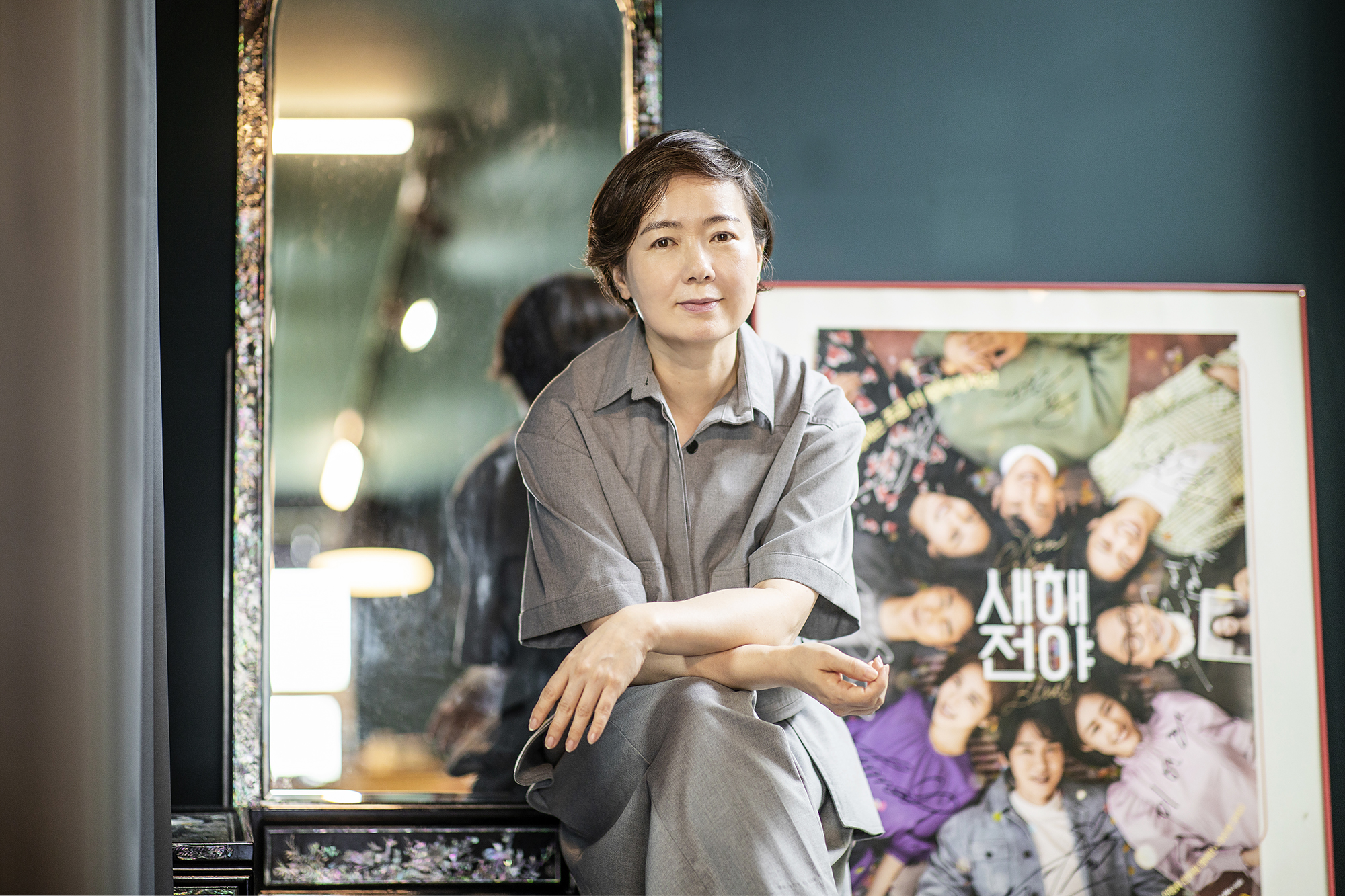- A Film Is a Whisper to the World September 29, 2021
-
Hong Ji-young (Philosophy at Graduate School, Entering Class of '94), Film Director Who Captures the Various Happiness
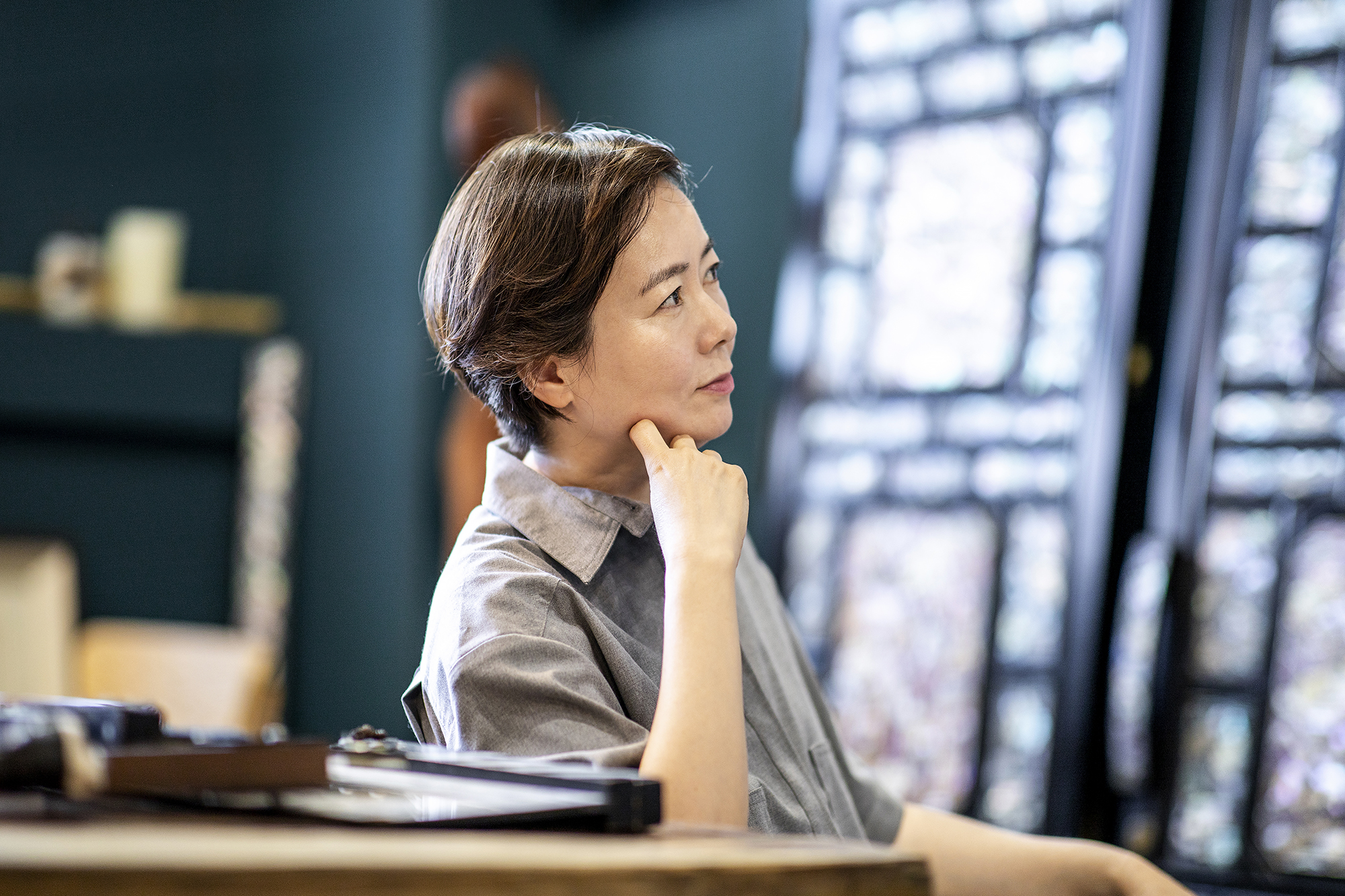
A film is a genre in which a director plays the central, quintessential role. From the director's point of view, elements such as actors, visual art, and music are planned, filmed, edited, and completed. Therefore, it is clear that a film contains a director's view of the world and their own story that they want to tell the world. A Yonsei University alumnus Hong Ji-young is one of the leading female directors in the Korean commercial film industry. Although she debuted at the late age of 38, she revealed her presence in the industry with her own stories and emotions. By using thoughts that everyone took for granted, and the unseen emotions of individuals in daily life, Hong has accumulated her filmography with various attempts through films such as The Naked Kitchen, Horror Stories, Marriage Blue, Will You Be There?, and New Year Blues.
Intense Yet Liberal, the Nourishing Time on Campus
On one side of Hong's studio, there is a bookcase full of books that once belonged to her late father. There is an accumulation of books across various topics such as sociology and especially philosophy. As one can see from such, she grew up in a household environment with extraordinary cultural sensitivity. With her father being the greatest inspiration, his emphasis on the importance of philosophy in life has contributed significantly to her decision to pursue philosophy as a major and film directing later in life.
"My father used to work in the forestry sector, with an avid interest in a wide range of fields such as philosophy, literature, and music. He always emphasized the importance of philosophy, to the extent that after retirement, he attended philosophy lectures every week by taking long bus trips across mountains. Therefore, it was no surprise that my father recommended philosophy as a major. Come to think of it, I was a really average girl during childhood, but I enjoyed finding answers by constantly throwing questions at myself repeatedly."
Hong, who completed her undergraduate studies and entered the Department of Philosophy at the Yonsei Graduate School, still vividly remembers the intense yet liberal seminars she attended at Yonsei. The workshops, in which students shared thoughts and insights on an issue in philosophy, involved heated discussions by senior Ph.D. candidate students, who were charismatic like the actual philosophers. The format of the seminars, which involved an exchange of thoughts and insights with the senior students, served as a good stimulus for Hong. With a strong passion for sociology as well, she also used to attend cultural anthropology lectures by Professor ChoHan Hae-joang. While there was much learning in the classes, her attempts, such as submitting a final assignment in the format of a scenario regarding "eldest daughter syndrome," also remain memorable experiences that served as valuable assets.
"Film production is a continuation of the process of constantly persuading others from the early scenario stage. You would get a lot of questions. Sometimes these questions might not be reasonable, but there is a need to understand the context to persuade others flexibly. Also, we have to understand that a film is made through the collaboration of countless individuals, which naturally makes it hard to do if you don't know how to argue and come to agreements with others. It was difficult for me at first, but I think I was able to equip myself with these required skills through experiences of finding answers through the skills I have learned in Yonsei - the skill to find answers by engaging in various arguments."
Seniors at Yonsei who are now colleagues working in the film industry and professors who have guided students to deepen and widen their thoughts. Relationships formed in graduate school still serve as valuable assets for Director Hong to date, as they interact and inspire each other even now.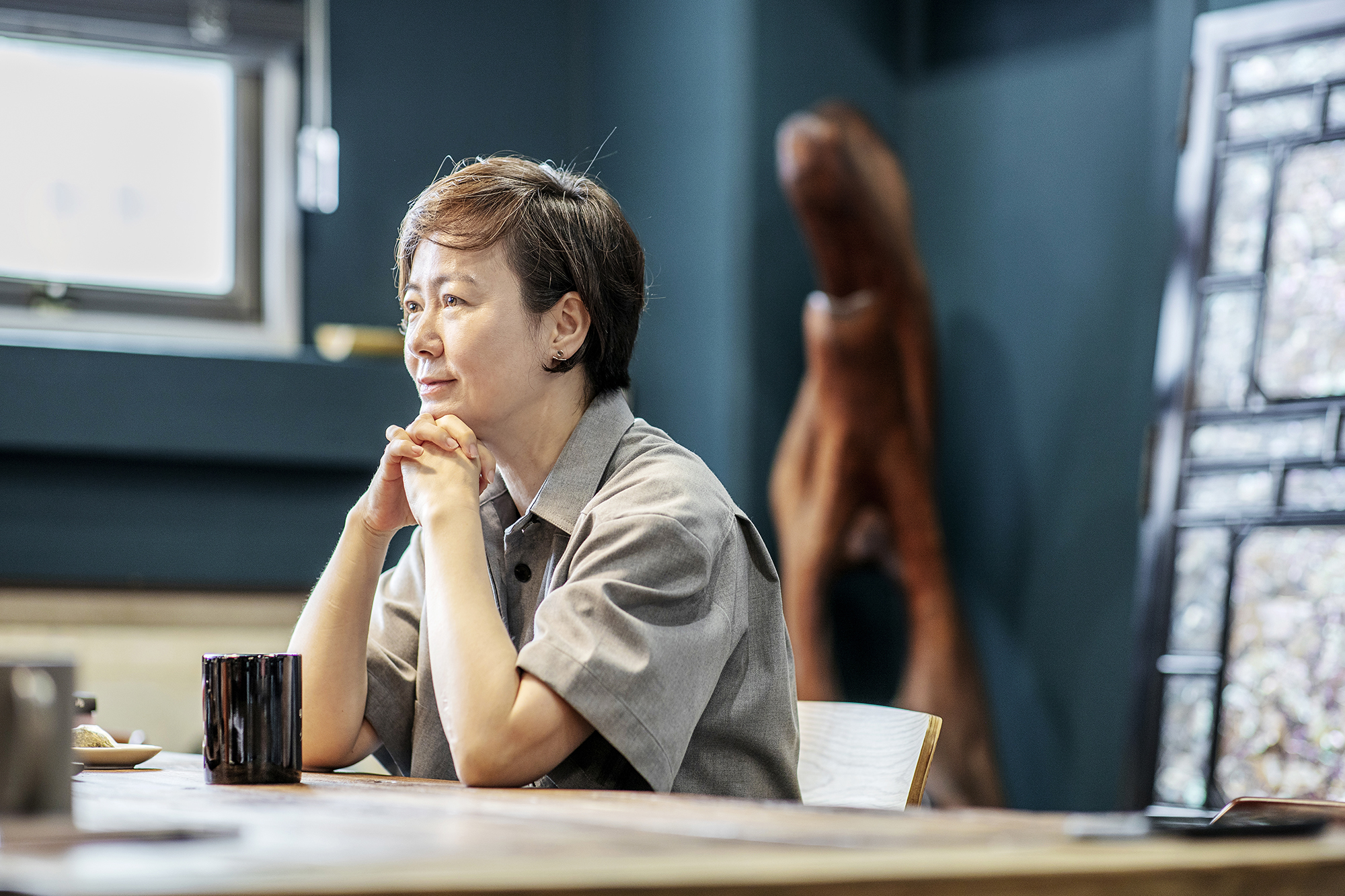
Finding the Most Interesting Thing to Do: Becoming a Film Director
An avid lover of movies, Hong's initial dream was to become a movie critic dealing with philosophical content. As she was about to finish her graduate studies, she felt that she had to experience the world of film production to become a critic.
"It was not fun to write reviews by simply looking at the superficial outlook of films and their mise-en-scène. I wanted to write something with a different insight from others. So I thought I had to understand the process of making a movie to write it properly. As such, I participated in the short film production workshop, and it was so much fun. Eventually influencing me to change my dream from being a critic to a director."
No one thought she could be a film director. People had a stereotype that the occupation as a director suits an individual with an outgoing personality with a loud voice and strong charisma. Her father was the only supporter of Hong Ji-young's new dream.
"As my father first heard about my new dream to be a film director, I remember him saying, "That sounds fun!" It was a surprise for me too. I expected my father to believe that I would continue studying philosophy in graduate school and proceed to the doctoral course. Yet he did not convince me to continue my studies. Without the support of my father, I think I could have given up my dream when I encountered difficult moments during my career. "Fun" became the fundamental standard for all my important decision-making from then on. I've made many decisions based on whether it is "fun or not.""
After graduating from graduate school, Hong enrolled in the Koran Academy of Film Arts (KAFA) for "the most fun thing to do:" filmmaking. KAFA serves as a cradle that provides a training ground for several filmmakers, with Hong being a 14th alumnus. The academy has also trained other renowned directors, such as Yonsei alumnus Bong Joon Ho and Min Kyu-dong, who later became Hong's husband.
After graduating from the academy, she spent a year building experience in the production department of a movie Interview. She believed that only by seeing the production field with her own eyes and understanding the situations would she not be flustered when directing her own film later. This turned out to be correct. After completing the movie's production, she married Director Min Kyu-dong and moved to Paris, where she began writing her feature-length scenarios. Though she was preparing for her official debut as a film director, realistic problems were lying ahead. Most of all, her path to becoming a director seemed more challenging as she decided to have a child at the age of 34.
"Initially, my debut as a film director came before having a child in my life, but when I decided to have a child, the order of my life changed dramatically. As my mother-in-law brought up having a child one day, I could see how much deliberation she went through; it was indeed hard to mention having a child when both my husband and I were struggling to work as film directors. With that, I decided to change my priorities. After all, it was something I had to do in my life anyway. At that time, the debut of a female director with a child was unprecedented. The debut was challenging even when I was preparing for it without any restrictions and obligations, so I was worried if I could pull it off while raising a child. But I placed my hopes that my husband would provide the fullest support. In retrospect, I guess it was the period of my life when I was more confident than ever. I was constantly telling myself, "I'm sure I'll do it," "I'm going to do it.""
With Hong's unique upbeat personality, people's concerns such as "It is unprecedented," "It is hard," and "Think about the decision again" did not affect her. There was confidence and conviction that "If there were no precedent, I would be precedent."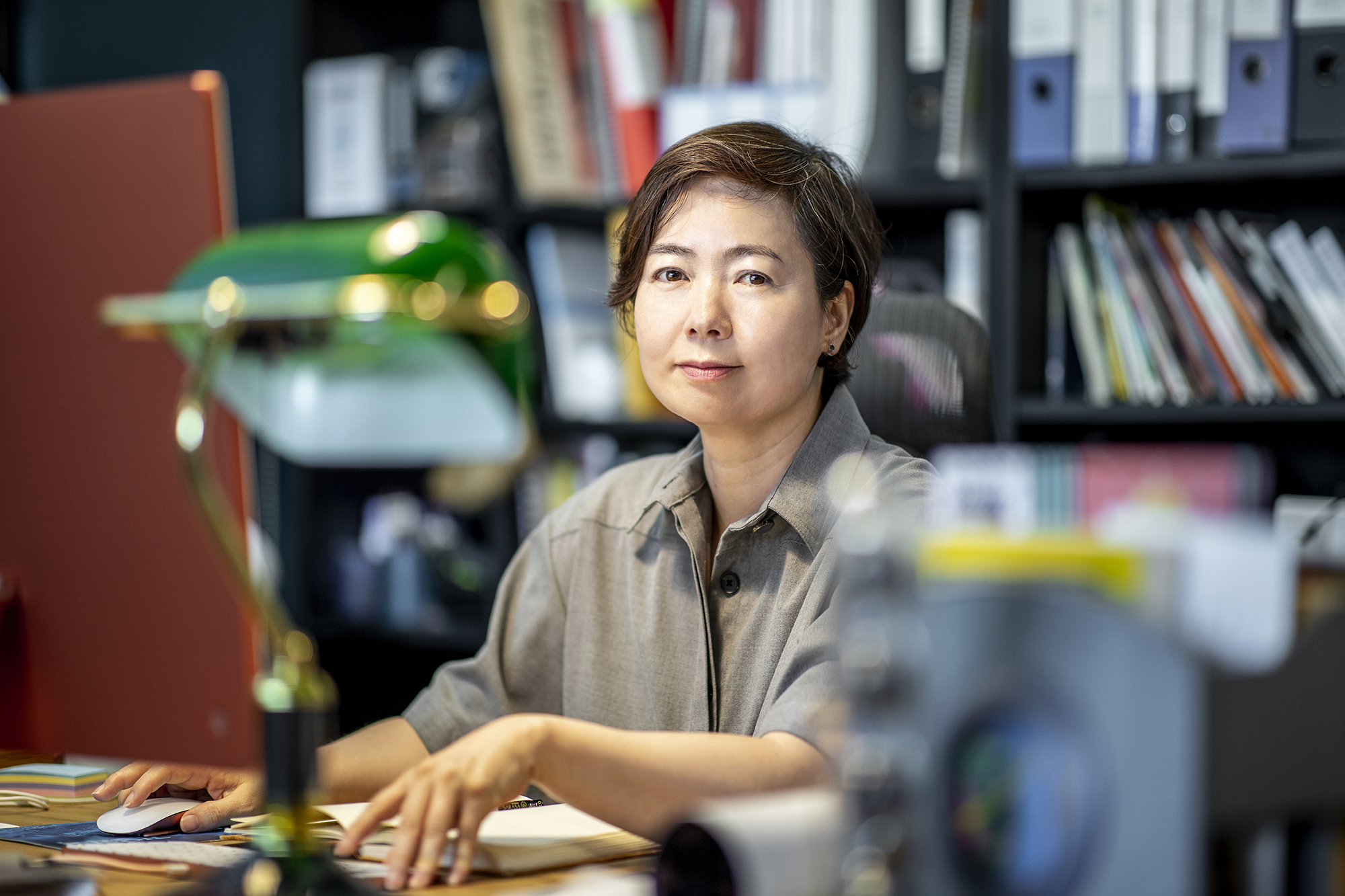
Baseless Belief: the Power that Made Debut Possible
Hong's debut film is The Naked Kitchen, released in 2009. The movie is considered a supreme quality that can never be completed with a total budget of 1.2 billion won. Looking back, it was like a miracle to her. Although the situation was challenging due to the limited budget, she even received loans. Hong tried to keep calm. The joy was greater despite the difficulties because it was an opportunity that came after a long preparation time. The experience was even more valuable because she had acquaintances who generously helped her with the work.
"I can say that acquaintances, not filmmakers around me, helped my debut. My acquaintances, such as interior designers and gallery curators, helped me with art, props, and space that I couldn't prepare properly due to low production costs. They placed their faith in me even though I had nothing to give back. I guess they felt sorry watching me struggling to become a film director. I was grateful. Those experiences also made me decide to trust someone similarly, without any grounds."
The atmosphere at the filming site was also great, to the extent where one actor even said, "It's like coming for a picnic." Such warmth in the atmosphere was possible only because of Hong's production style as a director, who would lead the scene without shouting even under challenging situations.
With Hong successfully making a debut as a film director in the commercial film industry, she has established her title as a talented director in the field with later films such as Marriage Blue and Will You Be There?, which were also her most renowned works. At the late age of 38, the debut of a female director with a child was as much a presence as it was unprecedented.
Distancing from Familiarity, Listening to Diversity
Suppose you look at Director Hong's work so far; you will discover a perspective that looks at the general and fixed idea by the vast majority with a sentiment of unfamiliarity. In that sense, her favorite topic is "diversity."
"We are all different beings, and I wanted to deliver the joy of discovering the unexpected to the audience. A film might reflect reality, but I also believe that it should also serve as a suggestion to the world. The topic of a love triangle, which I dealt with in the movie The Naked Kitchen, do you think is entirely negative? I produced this film while contemplating the issue that when looking at a relationship that the majority do not see as natural, to some, it might be a norm, and life revolving around such relationship also exist in the world-therefore before criticizing it, we could all take a moment to think about it."
Even when casting the actors, she would take into account what the actor has not tried, rather than the characters they used to act. For an actor with a decent and moral image, she would assign a more liberal image; for an actor who does not seem to fit with romance, she would give the most romantic character to show their new side.
The attention to diversity leads to careful observation of emotions. Significant occasions such as marriage, celebrating the new year, and graduation do carry the feeling of excitement like a festival. Still, they also bring other emotions such as anxiety, fear, and loneliness on a closer look. Her works, such as Marriage Blue and New Year Blues, managed to elicit empathy by dealing with emotions neglected by most people.
And the various emotions contained in her works lead to the fundamental question of "What is happiness?" and "What can be defined as happiness?" This is also a message that she ultimately wants to convey through her films. The question is embodied through the characters and incidents she created.
"This might be an abstract statement, but I really wish people could be happy. The happiness we define is all different, and the reasons are different. I want to continue making films that capture different types of happiness instead of one fixed image of being happy."
The Value Films Hold; Empathy and Changes of Audiences
Hong believes that as a creator and director, as long as she could create things that have never been seen, and through them, she could bring a transition in someone's life by serving as a turning point, her works would hold value. So every time she sees the response from the audience, she becomes more convinced that the movies are definitely worth making.
Her representative work, Will You Be There?, which deals with the idea of time slip, is a film adaptation of the renowned novel by globally famous French novelist Guillaume Musso. The book emerged as a best-selling novel across 30 nations around the world. Musso rarely allows movie rights to his works, but Hong was the first director ever to be allowed to modify and adapt his work as a film. The film was invited to the Brussels International Fantastic Film Festival (BIFFF), from which she had the honor to greet the original author himself as an audience. It was a nervous moment, but after watching the movie, Musso stated that "At first I thought it was a different story, but was the same after all." He even offered her the chance to make film adaptations of his other works. She has reinterpreted the original novel in her own way but conveyed the same message, which brought about empathy to the author.
Guillaume Musso's reaction, as the original author and an audience, made the movie production more rewarding and fulfilling. However, even if it's not about a celebrity, it is the most meaningful and rewarding thing for her to see the audience finding their way to happiness through her film.
"There was a case where an audience who watched New Year Blues sent letters and snacks to the production company. The letter said that the audience graduated from college early and worked for a large company for ten years without a break but then felt burnt out. After watching New Year Blues, that audience got to take a year off from work and look for something that the person really admired to do. I was very thankful, and it meant a lot. We invited the audience in-person to eat and talk. It was touching that my work served as an opportunity for meaningful change in someone's life."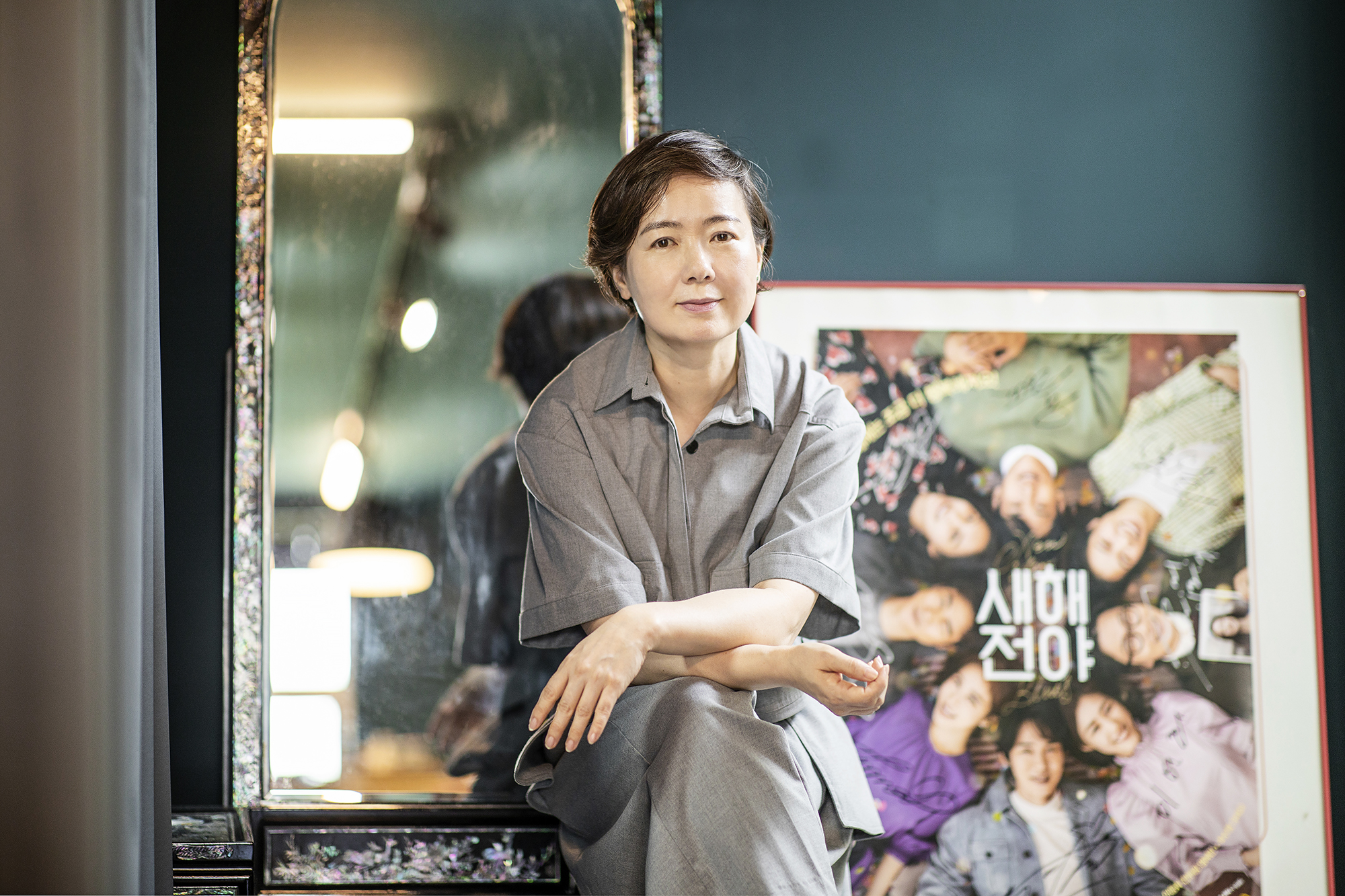
Challenging for Various Genres and Roles
Director Hong Ji-young enjoys the production stage the most among the film production processes that include scenarios, preparations for filming, casting, actual field shooting, editing, and post-production for sound work. The production stage is the liveliest moment as you produce something. So she wants to make new attempts as a director who constantly creates something new and presents it to the world.
"Making a movie is like a miracle. It's about making things that didn't exist in the world before. As a director, I want to try more various genres in the future. My directing ability is not limited to romantic dramas. There are still many things I want to show and talk about. I'm currently preparing horror movies with an American screenwriter, and I'd like to challenge myself in creating blockbusters and period dramas as well."
In addition to film production, she participates in various activities as a professor training future filmmakers at the KAFA and Chung-Ang University and the Gangwon Film Commission's commissioner. So she has a tight schedule going back and forth between Seoul, Busan, and Chuncheon. Even amid a hectic schedule, she tries to take a walk to organize her thoughts.
"I think those outstanding characters who have made great achievements in any field constantly continued to ponder their identities. When I face a challenge or have a problem to solve, I confront it by clearing my mind and thinking hard. Then the answer comes out. No matter how busy I am, I take time to walk around Namsan once or twice a week and organize my thoughts."
She claims that as one of the roles that she needs to play, she needs to be a role model for juniors in movie production or someone contemplating their career paths. She wants to mention the English word "becoming," which is the title of former United States first lady Michelle Obama's autobiography, to cheer for junior Yonseians.
"My ability yesterday may not exist today. That's because I always change. If someone affirms the future, saying, "You have this ability, so you will be like this," or "You can't make it," you should ask, "Why not?" At this time, trusting yourself without evidence will be the biggest help. If you need a role model, look at me. I came all the way here with that groundless belief."
For Hong, the movies she creates are "the whispers she gives to the world." Like careful ears, movies reveal the most personal concerns and show that there is someone in the world who will listen to those concerns. Like that, the film is a medium that "connects herself to the world that will listen to her story." Isn't this why she constantly asks herself questions, communicates with the world, and finds answers in every work?
show mobile menu
mobile menu

